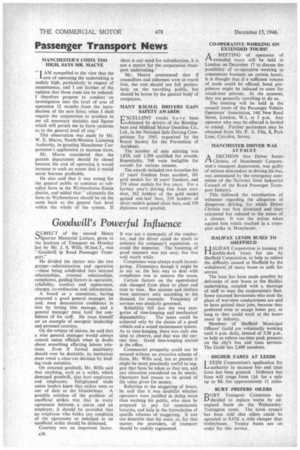Goodwill's Powerful Influence S UBJECT of the second Henry Spurrier Memorial
Page 46

If you've noticed an error in this article please click here to report it so we can fix it.
Lecture, given to the Institute of Transport on Monday last by Mr. J. S. Wills, M.Inst.T., was "Goodwill in Road Passenger Transport."
He divided the matter into the two groups—administration and operation —these being subdivided into internal relationships, external relationships, complaints, guiding factors in operation, reliability, comfort and appearance, charges, co-ordination and information.
A board or a committee, having procured a good general manager, he said, must demonstrate confidence in him by letting him manage, and a general manager must hold the confidence of his staff. He must himself set an example of energetic leadership and personal courtesy.
On the subject of unions, he said that a wise general manager would always consult union officials when in doubt about something affecting labour relations. Even if formal machinery should ever be desirable, its institution must await a clear-cut decision by leading trade unionists.
On external goodwill, Mr. Wills said that anything, such as a strike, which damaged goodwill, also hurt employers and employees. Enlightened trade union leaders knew that strikes were as out of date as the blunderbuss. A possible solution of the problem of unofficial strikes was that in every agreement between a union and an employer, it should be provided that an employee who broke any condition of the agreement or indulged in an unofficial strike should be dismissed.
Courtesy was an important factor.
A36 It was not a monopoly of the conductor, and the driver could do much to enhance his company's reputation, as could the inspector. The fostering of good manners was not easy, but was well worth while.
Complaints were always worth investigating. Elementary though it might be to say so, the best way to deal with complaints was to remove the cause.
Certain factors on the operational side changed from place to place and time to time. Bus stations and shelters were necessary only according to the demand, for example. Frequency of services was similarly governed.
Reliability fell into the two categories of time-keeping and mechanical dependability. The latter could be achieved only by the choice of a good vehicle and a sound maintenance system. As to time-keeping, there was only one time to observe, and that was the correct time. Good time-keeping started in the office.
Commercial prosperity could not be secured without an attractive scheme of , fares, Mr. Wills said, but at present it might be more practically useful to suggest that fares be taken as they are, and any alteration considered on its merits. Operators had reason to be proud of the value given for money.
Referring to the staggering of hours, he said that it was doubtful whether operators. were justified in doing more than warning the public, who must be prepared to pay for uneconomic luxuries, and help in the formulation of specific schemes of staggering. It was not desirable that the users, or, for that matter, the providers, of transport should be unduly regimented.












































































